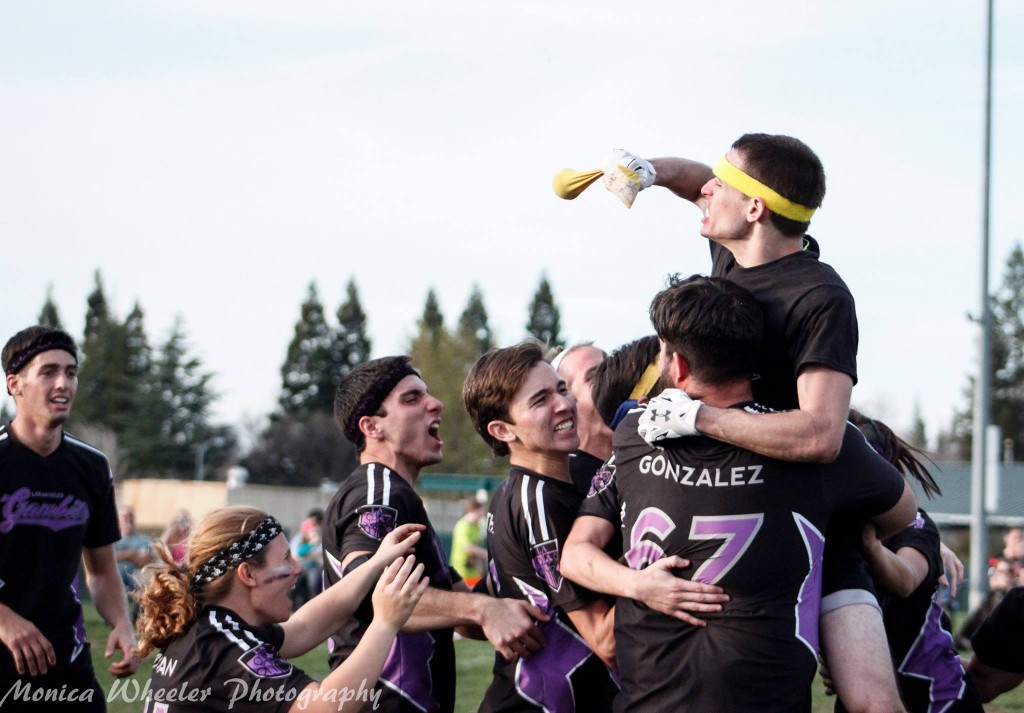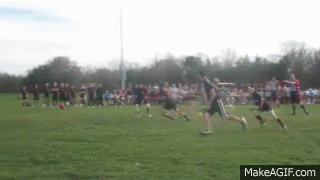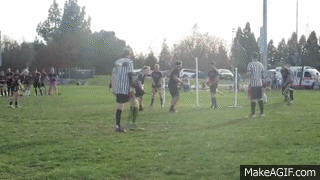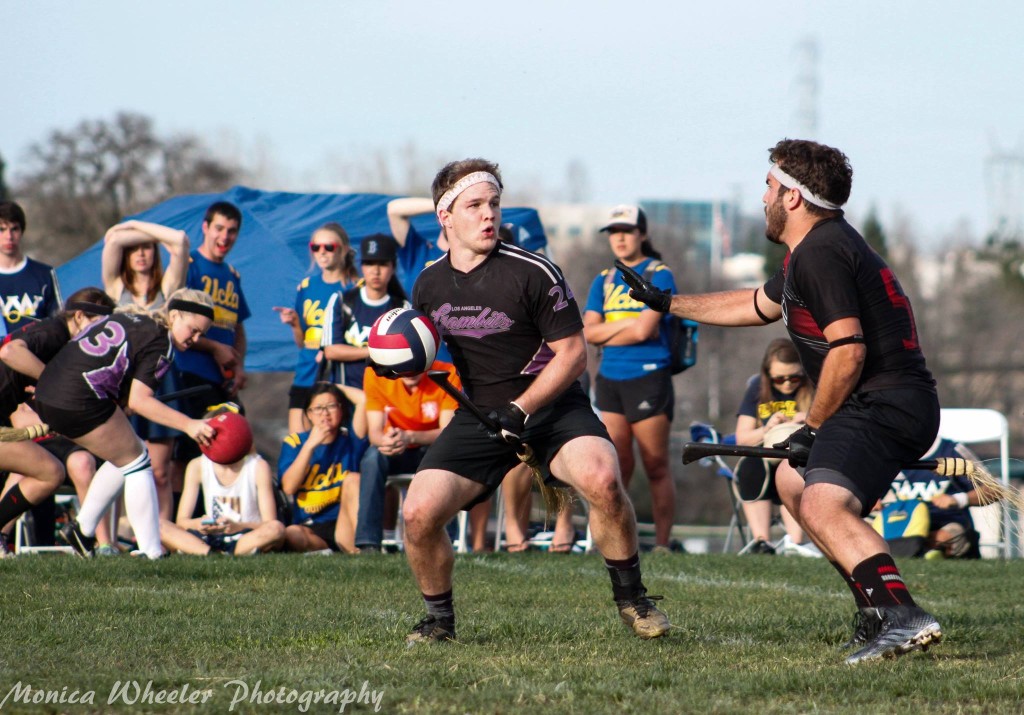Antwerp QC, Much of Belgian Core, Leaves Competitive Quidditch

Credit: Monica Wheeler
The LA Gambits defeated the Lost Boys in the finals of the West Regional Championship, 160*-100, and thanks to the magic of technology and the efforts of Arizona Quidditch Club beater Amanda Nagy, the video is available for all to see.
With so little time before the Southwest Regional Championship fills our collective conscience, and so little written about the topic so far, I wanted to get my thoughts out after reviewing the film.
Third Time is the Charm
There is a classic concept in the NFL that if you have beaten a team twice and are unfortunate enough to see them a third time in the playoffs, it is incredibly difficult to win again. The idea is that in the first two games, the losing team learns way more about the winning team than vice versa. That seems to be exactly the case during the West Regional Championship finals in the third match between the Gambits and the Lost Boys.
Perhaps the greatest difference between the finals and these rivals’ first two matches against each other was the Gambits’ success against the Lost Boys’ defensive zone, which had gotten the better of the Los Angeles-based community team just a month earlier at the LA Open.
The Lost Boys succeeded in their last matchup against the Gambits by manning chaser Ren Bettendorf, running a female chaser at point against keeper Tony Rodriguez and keeping two players by the hoops to defend against distance shots. What the Lost Boys targeted and shut down here were their opponent’s two main paths to scoring: Rodriguez’s drives and clutch passes to Bettendorf.
In the past, the Gambits would try to force scoring opportunities through the Lost Boys’ tailored defense, resulting in an ineffective offense. In the finals, however, the Gambits leaned into the curve of the defensive zone and started making passes to a wide-open male chaser. As shown below, this created a number of problems for the Lost Boys’ defense: If no one stepped up to the new ball carrier, he could drive; if the chaser marking Bettendorf stepped up, one of the most dangerous off-ball chasers in the game was now open; if the chaser marking Rodriguez stepped, he was now open; and even if the point defender didn’t make a move, she was still giving him a good foot and a half trying to mark him.

Using these basic principles, the Gambits successfully picked apart the Lost Boys’ defense early and often, opening up a 30-10 lead that quickly solidified the match as, at worst, a snitch-range situation that would favor the Gambits.
Fleeting Performances
Single-game individual performances can be a blessing and a curse in quidditch. With so few competitive games played throughout the season, and even less footage, players’ reputations can be defined by unfairly small sample sizes. Have a strong performance in a big game on film, and you’re on the short list for Team USA. Struggle or play a subpar game, and your reputation could suffer for years.
Because of the nature of notoriety in quidditch, I’m hesitant to write about two performances, but they are such important showings for me that I feel compelled to discuss them.
We’ll start with utility Missy Sponagle. At LA Open just a month ago, she was still too injured to log minutes of any consequence. But in the West Regional finals, an early injury to beater Maddy Wojdak put the onus on Sponagle to pretty much play the entire game. So, equipped with an Ashley Calhoun-esque knee brace, Sponagle put in one of the best games of her life, which is saying something for the most accomplished utility player in the sport’s young history—someone who has played in a World Cup final, a Gold Medal game and four consecutive Western Cup finals.
By my very unofficial count, Sponagle had at least three goal-saving beats. And these weren’t just right-place, right-time tap beats–these were bullets thrown from across the pitch at some of the best quaffle players in the sport. She could have even had a couple more if one or two bang-bang calls had gone the other way. The first time the Lost Boys conceded bludger control with her on the pitch, she simply went after Tanna Helm (below), bludgerless and with the Lost Boys playing defense, and didn’t just regain control–she forced Helm into a foul as well.

After Wojdak’s injury early in the game, Sponagle subbed out for just four defensive possessions. The Gambits scored on three of them. It won’t be remembered because it came in a losing effort, but it very much should be.
On the other end of the spectrum, you have chaser Jake Tieman. While his defining contribution to this match will almost certainly go down in the everyone’s collective memory as his helpless receiver red card, his actual performance was much worse. While his defensive play—if you can get past the helpless receiver penalty—was decidedly ordinary, offensively, he was a rusty, poorly-fitting cog in the otherwise fluid Lost Boys offense.
It is difficult to find yourself on the wrong side of a game that your beaters, for the most part, completely dominated, but the Lost Boys managed to do just that, and Tieman played a major role. Take, for example, a series of three plays, each a restart following a Gambits foul with the Lost Boys in possession. In one, the Lost Boys were up a chaser and Tieman had the ball five feet from an unguarded hoop; in another, they were up a beater; and in the third, they were up both, a two-man advantage.
On each of these three possessions, Tieman made the decisive play. Five feet from the right hoop, he chose to shoot for one of the other hoops instead and proceeded to miss (below). Up a beater, he caught a pass from Alex Browne and fired a shot right into Rodriguez’s chest. Up two players, he threw a pass from midfield, in the general direction of a female chaser near the hoops, that resulted in a turnover.

I’m willing to give him a pass on the first one, since he had to think about that shot for a long time, and mistakes happen in pressure-packed situations. But on the other two possessions, the Lost Boys were up a beater. Even if your team has average beaters, you can literally walk into the opponent’s defensive zone behind them, if you are up a man, and score with ease. Instead, Tieman chose an option with a much lower chance of success not just once, but twice.
It was not particularly surprising that after Brandon Scapa served Tieman’s penalty time for his helpless receiver tackle, the Lost Boys offense opened up again. An all-UCLA line of Scapa, Browne, Jeff Lin and Tiffany Chow scored on four of the next five possessions, running a silky-smooth, two-pass offense that got the team back in the game. Had Tieman even been slightly more effective with his time on the pitch, it could have been a completely different game.
Every game is going to have its heroes and its goats, and this one match doesn’t define Sponagle or Tieman. But it does do just a little bit to show how ascendant of a talent Sponagle really is, as well as highlight the potential pitfalls that remain in Tieman’s game even after a dominant LA Open performance.
They Are Who We Thought They Were
Coming into the season, many analysts thought we had a clear concept of who these two teams were. The Gambits were a powerful force, boasting one of the most physical chaser cores the West has ever seen, along with two of the sport’s top offensive threats in Rodriguez and Bettendorf. The Lost Boys, meanwhile, were ravaged by injuries and players leaving, and while their first line was as intimidating as ever, there was real concern about where the team would go from there.
Then the season started, and the Lost Boys flipped the script on all expectations. With the exception of a small hiccup against the Santa Barbara Blacktips back in the fall, the team won early and often. It saw breakout performances from Wojdak, Tieman and Brooke Lydon. It bested the Gambits twice and ran off an incredible streak of wins that culminated in a third consecutive West Regional finals appearance.
The Gambits, meanwhile, struggled to put it all together. Rodriguez, Bettendorf and Andrew Murray frequently looked disjointed offensively, and they often failed to show off the type of physicality everyone knew they were capable of displaying. The Gambits entered the West Regional without a single tournament win since September and a 0-2 record against their cross-city rivals.

Credit: Monica Wheeler
Then, the finals started, and—five months late—everything seemed to fall into the place as we expected. The Gambits’ offense moved the ball around at will and picked apart the Lost Boys’ defense. They dealt out tackle after tackle, whether they had to bring down Browne, Tieman or anyone else. Meanwhile, the Lost Boys lost Wojdak to an injury and Tieman to a red card and found themselves stretched dangerously thin. Frank Gao, who has bounced between chaser and beater, ended up as the team’s point defender for key defensive possessions. Sponagle’s brief respite left the team highly susceptible. Routine passes were dropped, ending valuable offensive opportunities. Suddenly, a team that seemed almost magically invincible all year was showing its cracks.
Of course, there is no reason to believe that one game is going to be more telling than an entire season up until that match. But it is also not irrational to consider that in the ever-small samples of quidditch, the stars just happened to have aligned perfectly for the Lost Boys all season while the Gambits have only improved. And, perhaps, preseason views are not as crazy as they might have looked a month ago.
Archives by Month:
- May 2023
- April 2023
- April 2022
- January 2021
- October 2020
- September 2020
- July 2020
- May 2020
- April 2020
- March 2020
- February 2020
- January 2020
- December 2019
- November 2019
- October 2019
- August 2019
- April 2019
- March 2019
- February 2019
- January 2019
- November 2018
- October 2018
- September 2018
- August 2018
- July 2018
- June 2018
- April 2018
- March 2018
- February 2018
- January 2018
- November 2017
- October 2017
- July 2017
- June 2017
- May 2017
- April 2017
- March 2017
- February 2017
- January 2017
- December 2016
- November 2016
- October 2016
- September 2016
- August 2016
- July 2016
- June 2016
- May 2016
- April 2016
- March 2016
- February 2016
- January 2016
- December 2015
- November 2015
- October 2015
- September 2015
- August 2015
- July 2015
- June 2015
- May 2015
- April 2015
- March 2015
- February 2015
- January 2015
- December 2014
- November 2014
- October 2014
- September 2014
- August 2014
- July 2014
- May 2014
- April 2014
- March 2014
- February 2014
- January 2014
- November 2013
- October 2013
- September 2013
- August 2013
- July 2013
- June 2013
- May 2013
- April 2013
- March 2013
- February 2013
- January 2013
- December 2012
- November 2012
- October 2012
Archives by Subject:
- Categories
- Awards
- College/Community Split
- Column
- Community Teams
- Countdown to Columbia
- DIY
- Drills
- Elo Rankings
- Fantasy Fantasy Tournaments
- Game & Tournament Reports
- General
- History Of
- International
- IQA World Cup
- Major League Quidditch
- March Madness
- Matches of the Decade
- Monday Water Cooler
- News
- Positional Strategy
- Press Release
- Profiles
- Quidditch Australia
- Rankings Wrap-Up
- Referees
- Rock Hill Roll Call
- Rules and Policy
- Statistic
- Strategy
- Team Management
- Team USA
- The Pitch
- The Quidditch Lens
- Top 10 College
- Top 10 Community
- Top 20
- Uncategorized
- US Quarantine Cup
- US Quidditch Cup
